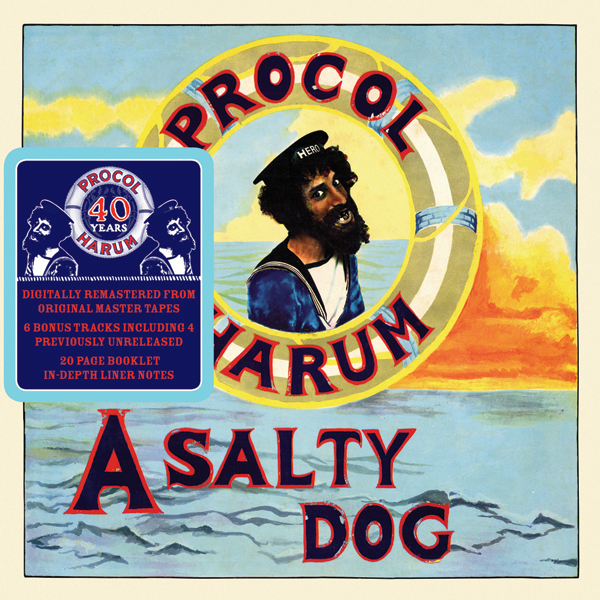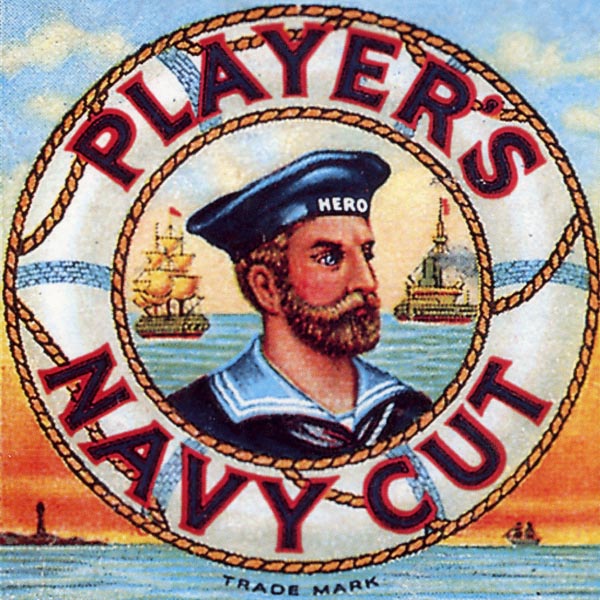“… how far can sailors fly?”
Part 1: this page provides commentary on the 2009 Salvo release of A Salty Dog (the album). Part 2 considers (comparatively) the 2015 Esoteric double disc release once I’ve had a chance to listen to it.
I should start out by saying that this is my favourite Procol Harum album; although perhaps not the best (I reserve Shine on Brightly for that honour), it’s the one I keep coming back to. Released in June of 1969, the same month I married the love of my life (poor dear girl is still with me!), and while I was working at International Music in Montreal (more on that story, if you want, here), it has special meaning for me beyond its obvious musical merits. The back cover of the Salvo edition says it is “rightly lauded as [their] masterpiece …. An unmissable musical voyage, a brilliant example of how to fuse classical music with rock and a tremendously rewarding experience ….” Pretty much sums it up.
 The
signature song on the album, of course, is the titular Brooker/Reid-composed
A Salty Dog, a genuine tour-de-force, which many consider to
be their best song. I must admit … I share that view (pace A
Whiter Shade of Pale!). Salty was also a hit single, issued in
May 1969 (but never rose above #44 in the UK). In June 1969, Chris Welch of
Melody Maker stated simply, “Their finest hour. Procol have given us
more than a successor to A Whiter Shade of Pale, they have given us
one of the greatest pop singles to emerge in recent years.” Can’t put it
better myself (of course, Mr Welch was/is a pro, whereas I …). And the liner
note writer, Henry Scott-Irvine, quotes Matthew Fisher: “I think it’s
Procol’s Citizen Kane!” Gary Brooker contends the song “… does seem
to be about man's journey through life in some way. It's also about the
group.” (I might mention that when the album was crammed on to Disc 2 with
Home in the Westside 30th Anniversary Anthology, they
omitted Salty (of all songs!) due to “space considerations.” Instead,
they put the mono single version on to Disc 3 with other singles,
B-sides and outtakes. Not a good decision, and many complaints – probably
the most commonly-cited weakness of the Westside box. They might have chosen
Juicy John Pink, as it was in mono, and perhaps might have
aesthetically fitted better on the Disc 3 hodgepodge. Salty might
have fitted anyway.)
The
signature song on the album, of course, is the titular Brooker/Reid-composed
A Salty Dog, a genuine tour-de-force, which many consider to
be their best song. I must admit … I share that view (pace A
Whiter Shade of Pale!). Salty was also a hit single, issued in
May 1969 (but never rose above #44 in the UK). In June 1969, Chris Welch of
Melody Maker stated simply, “Their finest hour. Procol have given us
more than a successor to A Whiter Shade of Pale, they have given us
one of the greatest pop singles to emerge in recent years.” Can’t put it
better myself (of course, Mr Welch was/is a pro, whereas I …). And the liner
note writer, Henry Scott-Irvine, quotes Matthew Fisher: “I think it’s
Procol’s Citizen Kane!” Gary Brooker contends the song “… does seem
to be about man's journey through life in some way. It's also about the
group.” (I might mention that when the album was crammed on to Disc 2 with
Home in the Westside 30th Anniversary Anthology, they
omitted Salty (of all songs!) due to “space considerations.” Instead,
they put the mono single version on to Disc 3 with other singles,
B-sides and outtakes. Not a good decision, and many complaints – probably
the most commonly-cited weakness of the Westside box. They might have chosen
Juicy John Pink, as it was in mono, and perhaps might have
aesthetically fitted better on the Disc 3 hodgepodge. Salty might
have fitted anyway.)
So, with the impact – and reputation – of the title tune, what could Procol possibly do for an encore? A great deal , as it turned out: the remaining nine songs are every bit as worthy, and serve to complement A Salty Dog – together they make up a genuinely classic album. There is definitely a nautical theme running through (although The Devil Came From Kansas, great song though it is, is an aberration from that, both in tone and style. I mean … Kansas, of all places, is about as far from any ocean as anywhere in the continental USA! Maybe it was deliberate; an attempt at irony, perhaps?). Still, Kansas is a masterpiece of hard rock, with wonderful guitar from Trower and steady bass from Knights, and the almost magical drums of BJ Wilson. But I’ve always thought it might have fitted better on Home (exchanged with Whaling Stories, perhaps? Except the latter probably hadn’t been written until a year or so later: second guessing is a fool’s game, I suppose!)
The music credits illustrate and emphasise the increasingly sophisticated instrumentation and arrangements, compared to the previous two albums, wherein the band members had played their usual, expected instruments for the most part. A change of recording venue facilitated these enhancements (more on this below). Indeed, the band contributed (very competently) all manner of extra instruments: Matthew Fisher adds both acoustic and (presumably) electric rhythm guitar (on Kansas), piano, marimba, recorder, and singing on Boredom, Wreck of the Hesperus and Pilgrim’s Progress (producer’s prerogative!), in addition to his usual Hammond organ and piano.
Gary Brooker adds celeste, recorder, harmonica, 3-stringed guitar, bells and woods to his usual (very) grand piano. BJ Wilson (whom I’ve always considered to be more of a percussionist than (just) a “drummer”) plays the usual traps kit, and adds conga drums and tabla here and there.
Keith Reid, of course, continues his role as wordsmith, Trower plays his guitars (plus a bit of sleigh bells), and (last but not least), David Knights contributed his understated, elegant bass playing. (The bass, in general, and Knights’s bass playing, in particular, is often unfairly under-appreciated – just listen to any mix without, then with, and you’ll see what I mean. Full disclosure: my brother is a working professional bassist and Chapman Stick © player, and my son was an orchestral and jazz/blues tuba player. So I’m biased … J)
A really interesting credit is to 'Kellogs', who, as it turns out, played the bosun’s whistle in the early bars of the atmospheric title tune, lending further “nautical authenticity”. When I first encountered this album, I recall checking the credits on the back cover while it was playing, and I figured, “Right! Kellogs! An insider joke credit. Ha-ha – “refreshments”, as in Corn Flakes or Rice Krispies, eaten between takes, at all-night sessions. And the whistle would have been a prize from the cereal box.” (We Canadians wouldn’t have found bosuns' whistles in our cereal boxes (maybe little hockey sticks?), but in nautical Olde Blighty … why not? Made sense.) Years later I learned that 'Kellogs' was in fact the nickname of John Kalinowski, an old friend from the band’s early days and who had served in a support capacity since the Paramounts. So, more fool me, I suppose! Sadly, he died in 2003. (There’s a fitting tribute here
Oddly, this album represents the first time this symphonically styled, even orchestral, band actually uses orchestral accompaniment, rendering A Salty Dog, All This And More and Wreck of the Hesperus all the more dramatic. Most impressively, the orchestral arrangements for these three tracks were done by Brooker (on the first two) and Fisher (on the third).
 To
keep the variety going, we have Crucifiction Lane (a homophone/pun on
‘crucifixion’ – possibly referring to Crucifix Lane, adjoining Southwark
Street – see production notes below), whereon Robin débuted on vocals, and
borrowed a Steve Cropper-style guitar arpeggio to give it an Otis Redding
feel (it reminds me of his I’ve Been Loving You Too Long, ably
covered by some band called the Rolling Stones). Add to all this the 12-bar
blues album cut Juicy John Pink and the B-side bonus track Long
Gone Geek – both in mono – to the completely contrasting acoustic folky,
island-y Boredom (with Matthew on marimba), and the startlingly
gentle (!) vocal stylings of young Mr Brooker on the equally folky Too
Much Between Us (a rare Brooker/Trower/Reid collaboration, and with –
yes – a sea reference).
To
keep the variety going, we have Crucifiction Lane (a homophone/pun on
‘crucifixion’ – possibly referring to Crucifix Lane, adjoining Southwark
Street – see production notes below), whereon Robin débuted on vocals, and
borrowed a Steve Cropper-style guitar arpeggio to give it an Otis Redding
feel (it reminds me of his I’ve Been Loving You Too Long, ably
covered by some band called the Rolling Stones). Add to all this the 12-bar
blues album cut Juicy John Pink and the B-side bonus track Long
Gone Geek – both in mono – to the completely contrasting acoustic folky,
island-y Boredom (with Matthew on marimba), and the startlingly
gentle (!) vocal stylings of young Mr Brooker on the equally folky Too
Much Between Us (a rare Brooker/Trower/Reid collaboration, and with –
yes – a sea reference).
About the more conventionally Procol-like tracks The Milk Of Human Kindness and All This And More: Milk reminds us of The Band (perhaps Brooker’s tribute to (in a sense) kindred spirits?), while All This, a ‘classic’ Procol Harum song reminiscent of the earlier period, remained a part of their concert repertoire and was recorded live in performance with the Edmonton Symphony Orchestra in 1971.
That leaves the two grand story-songs (after Salty): Wreck Of The Hesperus and Pilgrim’s Progress. Hesperus was penned by Fisher and Reid, and was in some ways an answer to (or a continuation of, or a conclusion to), in any case, a wholly dramatic response to A Salty Dog. While Salty was “a seaman’s log” of a difficult voyage, Hesperus stepped it up: its imagery was, by contrast, dramatic, violent, with Valkyries, coffins, funerals, cemeteries, “troubled” "stormy” seas, “all hope forever lost, one moments space, one moment's final fall from grace, burnt by fire, blind in sight, lost in ire.” Catastrophe! Wow! A sense of some of the feel in the upcoming album Home, maybe? All of this was pushed along, frantically, by a brilliant arpeggiating piano figure played by Fisher, accompanied by an orchestra, complete with thundering (but uncredited) timpani (possibly courtesy of BJ, but maybe an orchestral percussionist). Originally the song title had been the title of a Longfellow poem, which presented the tragic consequences of a sea captain's pride, and the term has since come to mean, colloquially, an indication of a dishevelled appearance (“you're beginning to look like the wreck of the Hesperus!”).
To conclude this magical album, we have Pilgrim’s Progress, a quiet, calm, reflective, summing-up song (“I sat me down to write a simple story, which maybe in the end became a song”). The entire poem (it is that!) is worth reading here, either by itself or while listening to the song. It’s as if it had been written for and about Matthew Fisher. It reminds us that this is not only the conclusion to the album, but also that this was Fisher’s (initial) swan song with Procol. There was a journey that he must undertake (“In starting out I thought to go exploring / and set my foot upon the nearest road”), and so he did, subsequent to the album’s release, to pursue solo work, on both sides of the glass. Interestingly, he produced Trower’s important solo work. He wasn’t to return until 1990 (The Prodigal Stranger indeed!). And he undertook his journey not without regret – “In fighting I did hurt those dearest to me / and still no hidden truths could I unfold.” He reportedly played nearly everything on the track, including the orchestra bells at the end (strangely, Gary Brooker is given credit for “bells” in the original “official” list, but not Fisher). Matthew apparently didn’t much like the song, calling it “overrated” – on the other hand (while I think A Salty Dog is the ‘best’ song on the album), Pilgrim’s Progress remains my favourite.
The lyrics of Pilgrim’s Progress represent to me the pinnacle of Keith Reid’s writing; only rarely would he return to the lyrical style that made him unique and so far above most other rock lyricists. By the dark follow-up album Home, he started becoming more topical, seemingly more connected to real-world politics and other issues, only occasionally returning to the whimsical Keith (eg Whaling Stories, Luskus Delph, Grand Hotel, Fires (which Burn Brightly)). No doubt personal and contemporary circumstances affected his writing, as they must, but his early style is why I love the first three albums so much compared to (some of) the others.
 Production:
A Salty Dog was a terrific maiden voyage for producer Matthew Fisher,
ably assisted and brilliantly engineered by the legendary Ken Scott
(excepting the mono-only Juicy John Pink (recorded by Ian Stuart (sic)
of Stones fame at their old rehearsal rooms on Southwark Street) and
Wreck of the Hesperus by Henry Lewy (recording venue unknown – not
documented in the booklet – possibly Los Angeles, where a few early tracks
were recorded, but later scrapped). The bulk of the album was recorded at
EMI’s Abbey Road (Ken Scott’s home turf), with all the advantages that
facility offered: 8-track recorder, availability of their vast instrument
inventory – hence the variety utilised.
Production:
A Salty Dog was a terrific maiden voyage for producer Matthew Fisher,
ably assisted and brilliantly engineered by the legendary Ken Scott
(excepting the mono-only Juicy John Pink (recorded by Ian Stuart (sic)
of Stones fame at their old rehearsal rooms on Southwark Street) and
Wreck of the Hesperus by Henry Lewy (recording venue unknown – not
documented in the booklet – possibly Los Angeles, where a few early tracks
were recorded, but later scrapped). The bulk of the album was recorded at
EMI’s Abbey Road (Ken Scott’s home turf), with all the advantages that
facility offered: 8-track recorder, availability of their vast instrument
inventory – hence the variety utilised.
Although Fisher had been given the producer role, reportedly he was unable to move past the lack of recognition for his co-composer status of the granddaddy of them all (sales-wise) ie A Whiter Shade of Pale. He went on to produce others (notably a solo Robin Trower, and himself) eventually to re-join the re-formed band in 1991, only to leave again in the early 2000s prior to the composer credit lawsuit.
Bonus tracks: in addition to the aforementioned Geek, there is a wonderful raw early (January 1969) take of The Milk of Human Kindness. The other four cuts are live from their 1969 USA tour: notable are the blues cover, Goin’ Down Slow, an old Howlin’ Wolf number, and Skip Softly (My Moonbeams), from their previous album Shine on Brightly, with an added twist of the 2001: A Space Odyssey opening fanfare from Also Sprach Zarathustra. Fisher’s Hammond B3 is an admirable and effective substitute for the (huge; 100-plus) Strauss orchestral scoring. Procol occasionally would do this sort of thing in concert, creating seemingly impromptu but delightful medleys. The studio version of Moonbeams already had a couple of early 20th century themes (toward the end) from Rodrigo and Khachaturian, so why not a little Richard Strauss?
The booklet is excellent: the band’s recent biographer, Henry Scott-Irvine (The Ghosts of A Whiter Shade of Pale), is credited for “project archive and audio consultancy” as well as for the extensive liner notes. He has once again created an interesting read, and appears to have ensured the best audio sources. The now iconic Players' cigarette package parody album cover, with “Hero” (the somewhat demented-looking sailor), designed by Dickinson (Keith Reid’s then girlfriend), is well reproduced, although admittedly it’s more effective in LP format. The booklet also has lots of reproductions of contemporary concert posters and record covers. I must say I really admire Salvo’s packaging of all their Procol releases: nicely printed on compact but durable little cardboard LP replicas.
A Salty Dog has been beautifully remastered, although it’s unclear whether the source is actually the original master tapes (usually, if it doesn’t say “original,” it isn’t). But whether it is or not, Rob Keyloch once again has done a very good digital transfer. The end result is a great album and a wonderful job done all round, and it remains for me to see (and hear) whether the Esoteric Recordings release will be any better. Apart from the addition of many more bonus tracks (as there’s a second disc), it also contains new notes by Scott-Irvine. If the quality of the latest remastering is similar to the Salvo’s, the difference will mostly depend on the new bonus tracks (from lists I’ve seen, it appears at least some of the bonus tracks and live cuts may be repeats of the Salvo’s). So we’ll see. You certainly can’t go wrong with the Salvo release (now deleted!), and I’ll report back on the Esoteric once I’ve had a chance to hear it.
“ … the words have all been writ by
one before me
We're taking turns in trying to pass them on … "
© Peter Bourne. October 2015